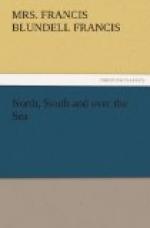[Illustration: THE GIRL HE LEFT BEHIND HIM ‘So that were the girl ye left behind ye’]
ELLENEY
Mrs. McNally’s house was situated at the extreme end of the village, and looked not upon the street, but right out into the glen, so that when Elleney opened her attic window in the morning her blue eyes feasted on a wilderness of trees, exquisite at this season with an infinite variety of tints; for the tender bloom of an Irish spring is only surpassed in beauty by the glories of an Irish autumn. The undulating masses that would in October glow with a myriad fires were now clad in the colours of the opal, delicate pinks and blues and greys of yet unopened buds forming a background to the pure vigorous green of larch or chestnut in full leaf, while here and there a group of wild cherry-trees—trees which in a few months would be clothed in the hues of the sunset—caught the morning light now on raiment as snowy as the summit of the Jungfrau.
Elleney gazed, and rubbed big eyes yet heavy with slumber, and gazed again; then she heaved a deep sigh, half of rapture, half of regret.
“It’s beautiful, entirely,” she said. “An’ that big black hill at the back o’ the trees is the grandest ever I seen. But I’d sooner be lookin’ out at the little green hills at our own place, with me poor father—the Lord ha’ mercy on his soul!—walkin’ about on them.”
She passed her hand across her eyes now for another reason, and then sighed again, but presently took herself to task.
“Sure, I’ve no call at all to be frettin’; I have a right to know better, so I have. Me poor dada is gone where he’s out of his throubles, please God; an’ amn’t I too well off myself here in this grand place, with me a’nt an’ everywan so kind to me? Ye ought to be ashamed o’ yourself, Elleney, to go cryin’ an’ frettin’ when it’s down on your knees ye should be, thankin’ God. Hurry up now, an’ on with your clothes an’ get the breakfast! Sunday mornin’ an’ all, an’ the girls down an’ workin’ about, I’ll engage.”
These remonstrances, which were made aloud with exceptional severity of aspect, but in the sweetest, softest little voice in the world, appeared to have the desired effect. The eyes were dried, the sobs checked, and soon Elleney emerged from her garret, and came clattering down the corkscrew stairs in her unyielding little best boots, clad all in her Sunday finery, every sunshiny hair in its place, and her blooming face a vision of wonder and delight to any chance beholder.
One such beholder encountered her in the narrow passage downstairs, and respectfully flattened himself against the wall to let her pass.
“It’s a fine mornin’, Miss Elleney,” said the young man.
Elleney started, stared, and then broke into a laugh.
“It’s you, is it, Pat Rooney? I didn’t know ye, ye’re so grand this mornin’. You do be generally all over flour—I never see you without lookin’ out for flour.”




